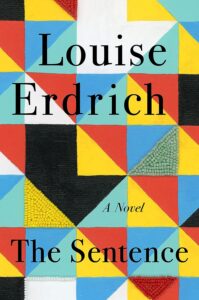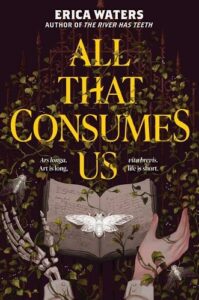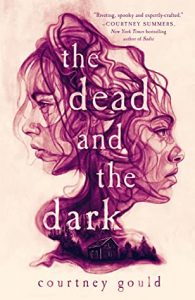Buy this from Bookshop.org to support local bookstores and the Lesbrary!
I kept hearing people rave about this book when it was new. I heard it was a cozy read about someone working in a bookstore haunted by the ghost of a customer. So imagine my surprise when the book begins with the main character remembering a woman she had a crush on convincing her to steal a body that turned out to have cocaine on it, which is how she got a life sentence. That wasn’t what I was expecting.
I hadn’t heard anything about this having queer content, but we know from the first chapter that Tookie is bisexual! It doesn’t use the word bisexual, though, and in the rest of the book, she’s in a long-term relationship with a man, so I suppose most people thought it wasn’t worth mentioning. As someone who’s always on the hunt for more queer books, though—especially by BIPOC authors, and especially especially by Indigenous authors—I wish someone had told me so I could have picked it up sooner!
This is a really difficult book for me to summarize. My overall impression is of a comforting, even cozy read, but as you might imagine from what I said in that first paragraph, that’s misleading. It’s also about death, racism, and Covid-19. It’s mostly set in an Indigenous bookstore; during Tookie’s time in prison, she fell in love with reading, and when she got out, she started working at the bookstore.
One of the regulars of the bookstore is Flora, a white woman who is heavily involved in the Minneapolis Indigenous community, and who hints at having an Indigenous grandparent with little to no evidence. She was annoying enough when she was alive, but after she dies—while reading a possibly deadly book?—she’s even worse. She begins haunting the bookstore and even tries to possess Tookie, in the ultimate form of cultural appropriation.
Meanwhile, the events of 2020 in Minneapolis play out, including loved ones hospitalized from Covid, and protests against the murder of George Floyd raging through the nights. Tookie’s marriage with her husband is complicated and somewhat fraught, and her relationship with her stepdaughter is even more difficult. When her stepdaughter shows up pregnant on their doorstep, looking for support, Tookie has to try to repair their relationship and unearth her nurturing side.
As I describe it, nothing about that sounds cozy—except, maybe, the bookstore setting. But Erdrich is such an incredible writer, especially when it comes to characterization, that I just fell into this novel. I loved Tookie’s voice so much, and all the characters, including Tookie’s family and coworkers, felt real. That network of support around her made this feel comforting even as she dealt with horrific circumstances.
This was my first Louise Erdrich book, and I’ll definitely be reading more. While the sapphic content isn’t the focus of this story, I can’t help but recommend this incredible, genre-bending read in any context I can.



